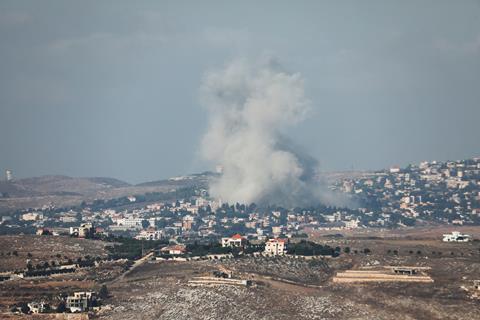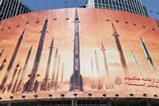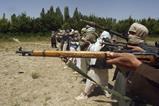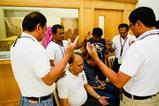Lebanon has more Christians than any country in the Middle East. Iran shows what full Hezbollah control would mean for the Church there and across the Middle East, says Dr Martin Parsons

At the end of April, the Lindisfarne Centre warned that open war between Hezbollah and Israel would be a catastrophe for Lebanon’s Christian population. The country has by far the highest percentage of Christians of any in the Middle East. And because it is a non-Islamic country, it is often the only safe haven for Christians fleeing persecution elsewhere, including large numbers who fled Islamic State (IS) in Iraq and Syria.
Lebanon’s population has always been a delicate balance of Christians, Sunni and Shi’a Muslims and a small Druze minority. This balance has been maintained by the constitution decreeing that the president must be a Christian, the prime minister a Sunni Muslim and the speaker a Shi’a Muslim.
However, in the 1970s, the inability of the government to rein in the Palestinian Liberation Organisation (PLO), which controlled Palestinian refugee camps and used them to launch attacks on Israel, led to various groups taking matters into their own hands. The result was a 15-year civil war, during which Israel responded to PLO attacks by invading and occupying southern Lebanon between 1982-85.
Iran and Hezbollah
While this was happening, the 1979 Iranian revolution led to the world’s first radical Islamist state. Iran’s new constitution gave the Iranian Revolutionary Guard Corps the duty of both ‘safeguarding’ the revolution at home and spreading it overseas. Within three years, it had established Hezbollah in Lebanon as a jihadist group fighting Israel, while at the same time seeking to create the same radical Islamist state that had been formed in Iran.
Hezbollah claimed the credit for Israel’s withdrawal from Lebanon in 1985. It then began to transform itself into what was in effect a political party, issuing an open letter in 1985 that set out the public version of its aims. Even though it has clearly been sanitised for public consumption, it says: “We obey the orders of one leader, wise and just, that of our tutor and jurist…[Ayatollah] Khomeini.
“Our behaviour is dictated to us by legal principles laid down by…the leading jurist [Ayatollah Khomeini]. In other words, whatever the Iranian Supreme Leader says is shari’a, must be enforced.
It goes on to say: “Allah has also made it intolerable for Muslims to participate in an unjust regime…which is not predicated upon the prescriptions of religion and upon the basis of the Law (the Shari’a) as laid down by Muhammad.”
In other words, Muslims cannot live under any form of government and law except Islamic government and shari’a law.
Finally: “We call upon you [Christians living in Lebanon] to embrace Islam so that you can be happy in this world and the next. If you refuse to adhere to Islam, maintain your ties with the Muslims and don’t take part in any activity against them.”
Christians in Iran
Hezbollah’s open letter is based on “the Constitution of Medina” which, according to early Islamic sources, Muhammad agreed in 622 with when he became ruler of Medina. The Medinan Jewish tribes were allowed to practice their religion but there was a catch – they were subservient to the Muslims and had to support them in war (jihad) with non-Muslims.
However, over the next five years, not only were the Jewish tribes expelled from their homes, but the men of the last remaining tribe were executed and the women and children enslaved after they were accused of failing to adequately support the Muslims in a battle with pagans.
The constitution of Medina is part of the basis for the Islamic concept of dhimmitude – by which Christians are permitted to live under Islamic government but without any actual rights as citizens. That is the implication here. In other words, Hezbollah’s objectives are for Lebanon to become like Iran.
So, it is worth looking at what happened to Christians in Iran after the 1979 Islamic revolution. In essence they were treated as dhimmis; historic Christian communities were allowed to worship subject to state surveillance, but any who sought to meet in homes were arrested or sometimes killed, with a number of extra judicial assassinations of Christian leaders. Publishing the Bible in Persian was banned and the Iranian Bible Society closed down in 1990. Today, significant numbers of Christians are arrested and imprisoned on vaguely worded charges.
Iran-Israel war
Israel has now launched what it described as a “limited, localised and targeted” ground offensive against Hezbollah in Lebanon. Iran immediately responded by launching around 200 ballistic missiles directly at Israel. Apart from the almost symbolic attack in April, this was the first time it has directly struck Israel.
While Western leaders call for Israel and Hezbollah to compromise, it’s important to understand how Iran views this conflict – and what that means for Christians in Lebanon and across the Middle East.
Immediately after the Iranian attack on Israel, Iran’s Supreme Leader made a rare appearance at Tehran’s Friday prayers where he described Israel as “the usurping regime”. He was alluding to a theological belief that, once an area of world has been subjected to Islamic law and government, then engaging in jihad against non-Muslims to reclaim it is an act of defence. That is why Hezbollah and Hamas, who share this belief, repeatedly refer to themselves as “the resistance front”.
In essence, the Iranian government views both Israel and Lebanon as being properly Islamic lands, whose current governments are illegitimate. The fact that Lebanon was established as a Christian majority state is, in their view, simply irrelevant.
So, whether Hezbollah emerges from this war strengthened or weakened is likely to affect the whole future of Christians not just in Lebanon, but across the Middle East.







































No comments yet